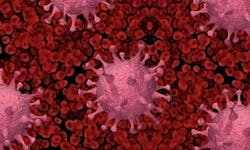A new study led by scientists at La Jolla Institute for Immunology (LJI) suggested that T cells try to fight SARS-CoV-2 by targeting a broad range of sites on the virus – beyond the key sites on the virus’s spike protein. By attacking the virus from many angles, the body has the tools to potentially recognize different SARS-CoV-2 variants, according to a news release from the institute.
The new research, published in Cell Report Medicine, is the most detailed analysis so far of which proteins on SARS-CoV-2 stimulate the strongest responses from the immune system’s “helper” CD4+ T cells and “killer” CD8+ T cells, according to LJI.
The immune system is very flexible. By re-scrambling genetic material, it can make T cells that respond to a huge range of targets, or epitopes, on a pathogen. Some T cell responses will be stronger against some epitopes than others. Researchers call the targets that prompt a strong immune cells response “immunodominant.”
For the new study, the researchers examined T cells from 100 people who had recovered from SARS-CoV-2 infection. They then took a close look at the genetic sequence of the virus to separate the potential epitopes from the epitopes that these T cells would actually recognize.
Their analysis revealed that not all parts of the virus induce the same strong immune response in everyone. In fact, T cells can recognize dozens of epitopes on SARS-CoV-2, and these immunodominant sites also change from person to person. On average, each study participant had the ability to recognize about 17 CD8+ T cells epitopes and 19 CD4+ T cell epitopes.
The new study shows that while the immune system often mounts a strong response against a particular site on the virus’s “spike” protein called the receptor binding domain, this region is actually not as good at inducing a strong response from CD4+ helper T cells.
Without a strong CD4+ T cell response, however, people may be slow to mount the kind of neutralizing immune response that quickly wipes out the virus.
Among the many epitopes they uncovered, the researchers identified several additional epitopes on the SARS-CoV-2 spike protein.
Researchers from the University of California, San Diego; Australia’s Murdoch University collaborated on the project.

